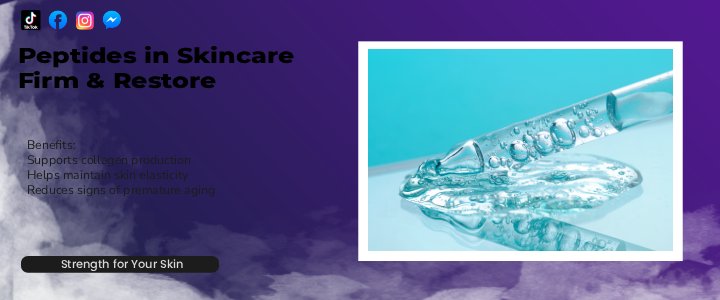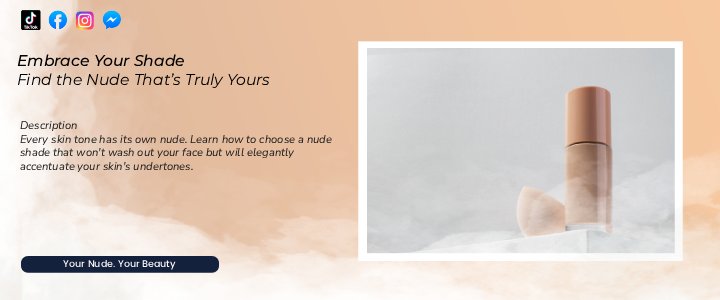Peptides Skincare
Peptides have become one of the most talked-about ingredients in skincare, often praised as a secret weapon for youthful, healthy skin. But what exactly are peptides, and do they truly live up to the hype?
From boosting collagen production to reducing the appearance of fine lines, peptides are gaining attention from dermatologists and skincare enthusiasts across the U.S. and Europe. If you’ve ever wondered whether peptides can really improve skin elasticity and smooth wrinkles, this guide will break down the science in simple terms.
What Are Peptides?
Peptides are short chains of amino acids, which are the building blocks of proteins in your body. In skincare, peptides are often highlighted because they support the production of collagen and elastin two essential proteins that keep skin firm, plump, and resilient.
As we age, collagen production naturally slows down, leading to visible signs of aging like wrinkles, sagging, and loss of elasticity. Topical skincare products with peptides are designed to signal the skin to “make more collagen,” almost like a gentle reminder to keep the skin’s support structure strong.
The Science Behind Peptides and Collagen
Research has shown that certain peptides can mimic the body’s natural processes, encouraging skin cells to repair themselves. For example, some peptides act as messengers, telling the skin to produce more collagen, while others help reduce inflammation or protect against environmental damage.
One clinical study found that peptides applied topically improved skin firmness and reduced wrinkle depth after consistent use for several weeks. While results vary, dermatologists generally agree that peptides can be a supportive part of an anti-aging skincare routine, especially when combined with other proven ingredients like retinol, niacinamide, or hyaluronic acid.
Types of Peptides in Skincare
Not all peptides are created equal. Different types play different roles in improving the skin. Here are a few commonly used peptides:
- Signal Peptides: These send “messages” to skin cells to produce more collagen and elastin, helping to maintain firmness and elasticity.
- Carrier Peptides: They deliver trace minerals such as copper to the skin, which aids in healing and promotes enzyme function for repair.
- Enzyme-Inhibitor Peptides: These work by slowing down the natural breakdown of collagen, helping skin maintain its structural support for longer.
- Neurotransmitter-Inhibitor Peptides: Often referred to as “Botox-like peptides,” these can relax facial tension and minimize expression lines, making wrinkles less noticeable.
By understanding the role of each type, consumers can choose peptide-based products tailored to their specific skin concerns.
Benefits of Peptides in Skincare
Adding peptides to your skincare routine can offer a variety of visible and long-term benefits.
- Boosts Collagen Production: Helps skin look firmer and more youthful.
- Reduces Wrinkle Appearance: Softens fine lines and expression wrinkles.
- Improves Elasticity: Enhances skin’s bounce and resilience.
- Strengthens Skin Barrier: Supports hydration and defends against environmental stressors.
- Pairs Well with Other Ingredients: Works effectively alongside retinol, hyaluronic acid, and antioxidants.
These benefits don’t happen overnight, but consistent use over several weeks or months often brings noticeable improvements.
How to Use Peptides Safely and Effectively
For the best results, dermatologists recommend incorporating peptides into both morning and evening routines.
- Choose the Right Form: Peptides are most effective in serums, creams, or moisturizers rather than cleansers (which wash off too quickly).
- Layer Smartly: Combine peptides with hydrating ingredients like hyaluronic acid for enhanced plumping.
- Be Consistent: Regular application is key peptides work over time, not instantly.
- Check for Certification: Look for products tested and approved by dermatologists or organizations like the Underwriters Laboratories for safety and quality.
Tip: If you’re new to peptides, start with a simple peptide serum applied after cleansing and before moisturizing. Pair it with sunscreen during the day for added protection.
Do Peptides Work for Everyone?
While peptides show promising results, individual outcomes can vary. Some people notice smoother skin within weeks, while others may need months of consistent use. Factors like age, overall skincare routine, and lifestyle habits (diet, sleep, sun exposure) can influence how well peptides work.
Think of peptides as part of a team: they’re not a one-stop solution, but they can significantly enhance the results of a well-rounded skincare regimen.
Conclusion
Peptides aren’t just a passing skincare trend they’re backed by science and practical results. By supporting collagen production, reducing wrinkles, and improving elasticity, peptides play a valuable role in modern anti-aging routines. If you’re looking to strengthen your skin barrier, smooth fine lines, and achieve a healthier glow, peptides are worth exploring.
So next time you’re scanning the skincare aisle or browsing online, don’t overlook peptides they might just be the missing piece your skin has been waiting for.



